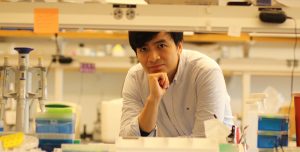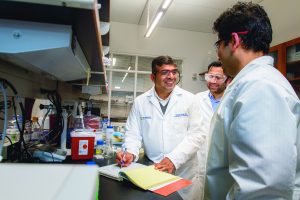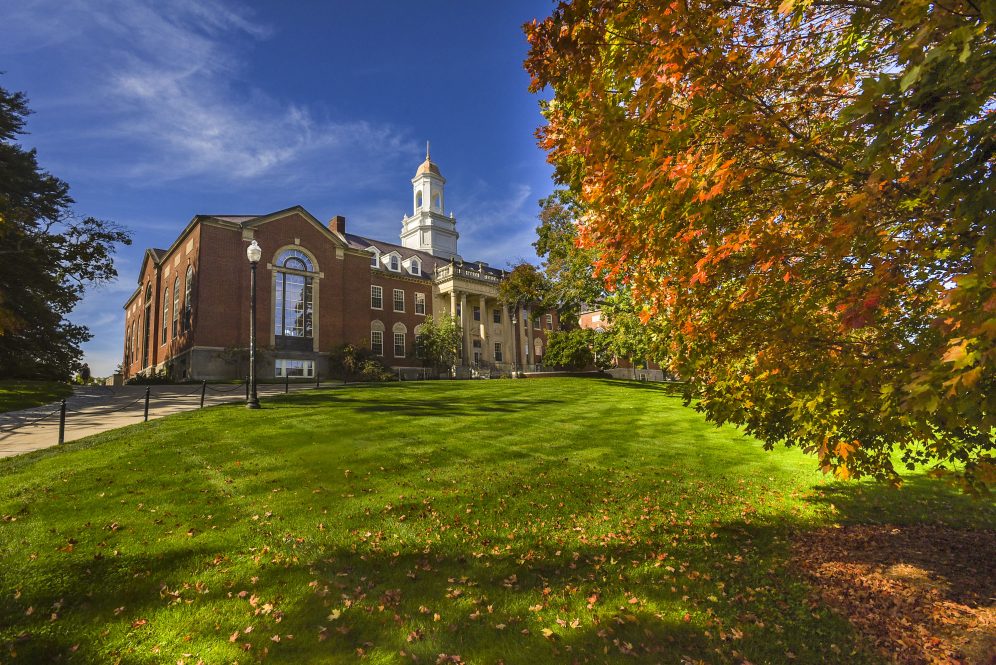Two UConn professors ventured on an unfamiliar journey that took them from the depths of their science labs to the complexities of technology entrepreneurship.
Last week, they learned their perseverance paid off: Raman Bahal, Pharmaceutical Sciences associate Professor, and Thanh D. Nguyen, Mechanical and Biomedical engineering associate professor, were among 124 emerging academic entrepreneurs in the U.S. named as 2024 Senior Members National Academy of Inventors (NAI).
They also fit the NAI’s category of underrepresented academic inventors.
“The underrepresented category includes all of our Senior Members that identify as non-white, female, and/or disabled,” says Rebekah Rittenhouse, assistant director of communications at NAI.

This year, 50% of senior members are also female and/or underrepresented academic inventors, NAI noted in their press release. The 2024 class is the largest to date and includes 60 member institutions across the nation.
Bahal hopes his work inspires fellow UConn scientists to relentlessly innovate.
“This award was a big honor and a good motivation to keep pursuing our research goals,” he says.
Bahal’s current work and patents focus on targeted drug delivery of RNA inhibitors in the kidneys and other organs. He’s exploring the possibility of targeted drug delivery at the interface of disease biology and bioconjugate chemistry. Bahal holds 12 provisional U.S. patents and three issued patents – and was a 2022-23 SPARK Technology Commercialization Fund Program recipient, which helped him generate key preclinical data he’s now presenting to prospective investors.
It was the unwavering support from UConn’s Technology Commercialization (TCS) department that ultimately helped Bahal take his research to the next level.
“It’s an excellent experience to learn how therapeutic can get commercialized from bench to bedside,” he says. “From filing invention disclosures to meeting with investors and explaining the innovation about the technologies we developed in a lab. We will be very happy if we can make an impact on patients’ lives. To achieve organ and cell-targeted drug delivery is a dream and one that I am proud to say we are now actively working on.”
For Nguyen, who has 18 patents in prosecution and six issued patents, his passion lies in research, but his motivation derives from a need to make a tangible impact on improving human lives.

In his lab, he’s nearly perfected an invention that focuses on a novel biomaterial that can dissolve without harm into the body, creating a painless injection free skin patch that wouldn’t require boosters. He’s also inventing a biodegradable skin cartilage application that has the potential to regrow damaged cartilage inside an arthritic joint. The first invention may be someday implanted into humans and animals without surgery, revolutionizing the way our country vaccinates.
“Our company is now working with a livestock vaccine company and big pharma. We have the potential to make a big impact here,” he says.
Although Nguyen’s job is technically professor, he has long aspired to break out of the lab.
“This is why I founded two startups,” he says.
Nguyen believes the ecosystem at UConn is “wonderful.” The business and technical guidance he received from TCS equipped him with tools he needed to market his technology.
“Commercializing tech and research is a way to really benefit UConn. Not only does the school make money, but the ultimate goal of research is to help people and to improve quality of life,” he says.
Nguyen hopes his success serves as motivation for his students to join him in venturing outside of their labs.
“My patents have my students’ name on them as well,” he says proudly. “They’re inventors, too. If my students are not experimenting, if they don’t try to modify, I teach them that their idea will never take off. We all brainstorm and discuss – how can this be more perfect? How can it help more people improve their quality of life?”
Bahal and Nguyen will be honored with the 2024 class of Senior Members at NAI’s Annual Conference taking place June 16-18th, 2024 in Raleigh, North Carolina.



